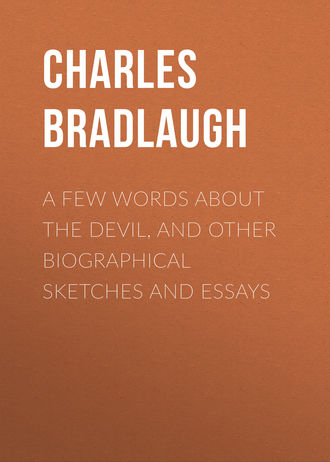 полная версия
полная версияA Few Words About the Devil, and Other Biographical Sketches and Essays
Now, should a birth have taken place at any of the eight stages, would the child thus prematurely born have had a soul? That is the question I propose to you. You who affirm that man has a soul, it lies upon you, here, without charging me with blasphemy – without charging me with ignorance – without charging me with presumption – it lies upon you who affirm, to state the grounds for your belief. At which stage, if at any, did the soul come into the child? At the moment of the birth? Why when a child is born into the world it can scarcely see – it can not speak – it can not think – but after a short time I jingle my keys, and it begins to give faint smiles; and after a few weeks, it is pleased with the jingling of my keys. Is it the soul which is learning to appreciate the sound of the jingling keys, and pleased with them? Is it the immaterial and immortal soul amused and pleased with my bundle of keys? Where is the soul? How is it that the soul can not speak the moment the child is born – can not even think? How is it, that if I keep that child without telling it any thing of its soul until it become fourteen or fifteen years of age, it would then speak and think as I had taught it to speak and think; and if I kept it without the knowledge of a soul, it would have no knowledge of a soul at that age? How is that? Rajah Brooke, at a missionary meeting in Liverpool, told his hearers there that the Dyaks, a people with whom he was connected, had no knowledge of God, of a soul, or of any future state. How is it that the Dyaks have got this soul and yet live knowing nothing whatever about it? And the Dyaks are by no means the only people who live and die knowing nothing of any immortal and immaterial soul. Again you tell me that this soul is immortal. Do you mean that it has eternally existed – has never been created? If so, you deny a God who is the creator of all things. If the soul began at some time to exist, where is the evidence that it will not also at some time cease to exist? It it came into existence with the body's birth, why not cease with the body's death? You say the soul is immaterial; do you mean that it is susceptible to material conditions or do you not? If susceptible to material conditions, what do you mean by its being immortal and immaterial? If not susceptible to material conditions, then explain to me how it is that under good conditions it prospers and advances, and under bad conditions deteriorates and recedes. If a child is born in some of the back streets of our city, and lives on bad food in a wretched cellar, it grows up a weak and puny pale-faced child. If allowed to crawl into existence on the edge of a gutter, imperfectly educated, in fact mis-educated, it steals – steals, perhaps, to live – and it becomes an outcast from society. Is this immortal soul affected by the bodily conditions? or is the soul originally naturally depraved? And if the soul is primarily naturally depraved, why is God so unjust as to give a naturally depraved soul to any body? If not, how is it that this immortal soul, when the body is kept without food, permits the man who has no money to buy food, to steel to satisfy his hunger? You allege that the soul moves my body. You assert that matter is inert, unintelligent; that it is my active, intelligent soul that moves and impels my inert and non-intelligent body. Is my immortal soul hindered and controlled by the state of my body's general health? Does my soul feel hungry and compel my body to steal? Some theologians declare that my soul is immaterial – that there is no means by which I can take any cognizance whatever of it. What does that mean, except that they know nothing whatever about it? Sir W. Hamilton admits that we are entirely ignorant as to the connection between soul and body. Yet many who in so many words admit that they have no knowledge, but only faith in the soul's existence, are most presumptuous in affirming it, and in denouncing those who dispute their affirmation. It is an easy method to hide ignorance, by denouncing your opponent as an ignorant blasphemer.
Joseph Priestley, in his book upon matter and spirit, quotes from Hallet's discourses, as follows; "I see a man move and hear him speak for some years. From his speech I certainly infer that he thinks, as I do. I then see that man is a being who thinks and acts. After some time the man falls down in my sight, grows cold and stiff, and speaks and acts no more. Is it not then natural to conclude that he thinks no more; as the only reason I had to believe that he did think was his motion and his speech. And now that his motion and speech have ceased, I have lost the only way of proving that he had the power of thought. Upon this sudden death, one visible thing, the one man, has greatly changed. Whence could I infer that the same being consisted of two parts, and that the inward part continues to live and think, and flies away from the body? When the outward part ceases to live and move, it looks as if the whole man was gone, and that he, with all his powers, ceases at the same time. His motion and thought both die together, as far as I can discern. The powers of thought, of speech and motion, equally depend upon the body, and run the same fate in case of declining age. When a man dies through old age, I perceive his powers of speech, motion, and thought decay and die together, and by the same degrees. That moment he ceases to move and breathe he appears to cease to think, too. When I am left to my reason it seems to me that my power of thought depends as much upon the body as my sight and hearing. I could not think in infancy; my power of thought, of sight, and of feeling are equally liable to be obstructed by the body. A blow on the head has deprived a man of thought, who could yet see, and feel and move; so naturally the power of thinking seems as much to belong to the body as any power of man whatsoever. Naturally there appears no more reason to suppose that a man can think out of the body than he can hear sounds and feel cold out of the body."
What do those mean who say that man is made up of two parts – matter and mind? I know of only one existence. I find that existence manifested variously, each mode having certain variations of attributes by which it is cognized. One of these attributes, or a collection of certain attributes, I find in, or with, certain modifications of that existence, that is, in or with animal life – this attribute, or these attributes, we call intelligence. In the same way that I find upon the blade of a knife brightness, consequent upon a certain state of the metal, so do I find in man, in the beast, different degrees, not of brightness, but of intelligence, according to their different states of organization. I am told that the mind and the body are separate from one another. Are the brightness and steel of the knife separate? Is not brightness the quality attaching to a certain modification of existence – steel? Is not intelligence a quality attaching to a certain modification of existence – man? The word brightness has no meaning, except as relating to some bright thing. The word intelligence, no meaning, except as relating to some intelligent thing. I take some water and drop it upon the steel, in due course the process of oxidation takes place and the brightness is gone. I drop into man's brain a bullet; the process of destruction of life takes place, and his intelligence is gone. By changing the state of the steel we destroy its brightness, and by disorganizing the man destroy his intelligence. Is mind an entity or result? an existence or a condition? Surely it is but the result of organic activity, a phenomenon of animal life. Dr. Engledue says: "In the same way as organism generally has the power of manifesting, when the necessary stimuli are applied, the phenomena which are designated life; so one individual portion – brain, having peculiar and distinct properties, manifests on the application of its appropriate stimuli a peculiar and distinct species of action. If the sum of all bodily function – life, be not an entity, how can the product of the action of one portion of the body – brain, be an entity? Feeling and intelligence are but fractional portions of life." I ask those who are here to prove that man has a soul, to do so apart from revelation. If the soul is a part of ourselves, we require no supernatural revelation to demonstrate its existence to us. D'Holbach says: "The doctrine of spirituality, such as it now exists, affords nothing but vague ideas; it is rather a poisoner of all ideas. Let me draw your attention to this: The advocates of spirituality do not tell you anything, but in fact prevent you from knowing anything. They say that spirit and matter have nothing in common, and that mortal man can not take cognizance of immortality. An ignorant man may set himself up as an orator upon such a matter. He says you have a soul – an immortal soul. Take care you don't lose your soul. When you ask him what is my soul, he says he does not know – nobody knows – nobody can tell you. This is really that which they do. What is this doctrine of spirituality? What does it present to the mind? A substance unsubstantial that possesses nothing of which our senses enable us to take cognizance." Theologians urge that each of us has a soul superior to all material conditions, and yet a man who speaks can not communicate by his speaking soul so freely with that man who is deaf and dumb; the conditions cramp that which is said to be uncontrolled by any conditions. If you cut out a man's tongue, the soul no longer speaks. If you put a gag in his mouth, and tie it with a handkerchief, so that he can not get it out, his soul ceases to speak. The immaterial soul is conquered by a gag, it can not utter itself, the gag is in the way. The orthodox say that the soul is made by God; and what do you know about God? Why just as much as we know about the soul. And what do you know about the soul? Nothing whatever. How is it that if the soul is immaterial, having nothing in common with matter, that it is only manifest by material means? and how is it that it is incased and inclosed in my material frame? They affirm that my soul is a spirit – that I receive the same spirit from God. How is it that my spirit is now by myself, and by my mortal body, denying its own existence? Is my mortal soul acting the hypocrite, or is it ignorant of its own existence, and can not help itself to better knowledge? And if it can not help itself, why not, if it is superior to the body? and if you think it a hypocrite, tell me why.
What is meant by the declaration that man is a compound of matter and spirit? – things which the orthodox assert have nothing in common with one another. Of the existence of what you call matter you are certain, because you and I, material beings, are here. Are you equally certain of the existence of mind, as an existence independent and separate from matter? and if you are, tell me why. Have you ever found it apart from matter? If so, when and where? Have you found that the mind has a separate and distinct existence? if so, under what circumstances? and tell me – you who define matter as unintelligent, passive, inert, and motionless – who talk of the vis inertiæ of matter – tell me what you mean when you give these definitions to it? You find the universe, and this small portion of it on which we are, ceaselessly active. Why do you call it passive, except it be that you want courage to search for true knowledge as to the vast capabilities of existence, and, therefore, invent such names as God and Soul to account for all difficulties, and to hide your ignorance? What do you mean by passive and inert matter? You tell me of this world – part of a system – that system part of another – that of another – and point out to me the innumerable planets, the countless millions of worlds, in the universe. You, who tell me of the vast forces of the universe, what do you mean by telling me that that is motionless? What do you mean by yet pointing to the immeasurable universe and its incalculably mighty forces and affirming that they are incapable of every perceptible effect? You, without one fact on which to base your theory, strive to call into existence another existence which must be more vast, and which you allege produces this existence and gives its powers to it. Sir Isaac Newton says: "We are to admit no more causes of things than are sufficient to explain appearances." What effect is there which the forces of existence are incapable of producing?
Why do you come to the conclusion that the forces of the universe are incapable of producing every effect of which I take cognizance? Why do you come to the conclusion that intelligence is not an attribute – why? What is there which enables you to convert it into a separate and distinct existence? Is there anything? Is it spirit? What is spirit? That of which the mortal man can know nothing, you tell me – that it is nothing which his senses can grasp – that is, no man, but one who disregards his senses, can believe in it, and that it is that which no man's senses can take cognizance of. If a man who uses his senses can never by their aid take cognizance of spirit, then as it is through the senses alone man knows that which is around him, you can know nothing about spirit until you go out of your senses. When I speak of the senses, I do not limit myself to what are ordinarily termed man's five senses – I include all man's sensitive faculties, and admit that I do not know the extent of, and am not prepared to set a limit to, the sensitive capabilities of man. I have had personal experience in connection with psycho-magnetic phenomena of faculties in man and woman not ordinarily recognized, and am inclined to the opinion that many men have been made converts to the theories of spiritualism because their previous education had induced them to set certain arbitrary limits to the domains of the natural. When they have been startled by phenomena outside these conventional limitations they at once ascribed them to supernatural influences rather than reverse their previous rules of thinking.
Some urge that the soul is life. What is life? Is it not the word by which we express the aggregate normal functional activity of vegetable and animal organisms necessarily differing in degree, if not in kind, with each different organization? To talk of immortal life and yet to admit the decay and destruction of the organization, is much the same as to talk of a square circle. You link together two words which contradict each other. The solution of the soul problem is not so difficult as many imagine. The greatest difficulty is, that we have been trained to use certain words as "God," "matter," "mind," "spirit," "soul," "intelligence," and we have been further trained to take these words as representatives of realities, which, in fact, they do not represent. We have to unlearn much of our school lore. We have specially to carefully examine the meaning of each word we use. The question, lies in a small compass. Is there one existence or more? Of one existence I am conscious, because I am a mode of it. I know of no other existence. I know of no existence but that existence of which I am a mode. I hold it to be capable of producing every effect. It is for the man who alleges that there is another, to prove it. I know of one existence. I do not endeavor to demonstrate to you my existence, it needs no demonstration – I am My existence is undeniable. I am speaking to you You are conscious of my existence. You and I are not separate entities, but modes of the same existence. We take cognizance of the existence which is around us and in us, and which is the existence of which we are modes. Of the one existence we are certain. It is for those who affirm that the universe is "matter," and who affirm that there also exists "spirit," to remember that they admit the one existence I seek to prove, and that the onus lies on them to demonstrate a second existence – in fact, to prove there is the other existence which they term spiritual. There can not exist two different substances or existences having the same attributes, or qualities. There can not be two existences of the same essence, having different attributes, because it is by the attributes alone that we can distinguish the existences. We can only judge of the substance by its modes. We may find a variety of modes of the same substance, and we shall find points of union which help to identify them, the one with the other – the link which connects them with the great whole. We can only judge of the existence of which we are a part (in consequence of our peculiar organization) under the form of a continuous chain of causes and effects – each effect a cause to the effect it precedes, each cause an effect of the causative influence which heralded its advent. The remote links of that line are concealed by the darkness of the far off past. Nay, more than this, the mightiest effort of mind can never say, This is the first cause. Weakness and ignorance have said it – but why? To cloak their weakness, to hide their ignorance. Knaves have said it – but why? To give scope to their cunning, and to enable them to say to the credulous, "Thus far shalt thou go and no farther." The termination is in the as yet unknowable future; and I ask you, presumptuous men, who dare to tell me of God and soul, of matter and creation – when possessed you the power to sunder links of that great chain and write, "In the beginning?" I deny that by the mightiest effort of the strongest intellect man can ever say of any period, at this point substance began to be – before this existence was not.
Has man a soul? You who tell me he has a soul, a soul independent of material conditions, I ask you how it is that these immortal souls strive with one another to get mortal benefits? Has man a soul? If man's soul is not subject to material conditions, why do I find knavish souls? – Why slavish souls? – tyrannous souls? Your doctrine that man has a soul prevents him from rising. When you tell him that his soul is not improvable by material conditions, you prevent him from making himself better than he is. Man's intelligence is a consequence of his organization. Organization is improvable, the intelligence becomes more powerful as the organization is fully developed, and the conditions which surround man are made more pure. And the man will become higher, truer, and better when he knows that his intelligence is an attribute, like other attributes, capable of development, susceptible of deterioration, he will strive to effect the first and to guard against the latter.
Look at the number of people putting power into the hands of one man, because he is a lord – surely they have no souls. See the mass cringing to a wretched idol – surely these have no souls. See men forming a pyramid of which the base is a crushed and worn-out people, and the apex a church, a throne, a priest, a king, and the frippery of a creed – have those men souls? Society should not be such a pyramid, it should be one brotherly circle, in which men should be linked together by a consciousness that they are only happy so linked, conscious that when the chain is broken, then the society and her peace is destroyed. What we teach is not that man has a soul apart and independent of the body, but that he has an ability, an intelligence, an attribute of his body, capable of development, improvable, more useful, according as he elevates himself and his fellows. Give up blind adhesion to creeds and priests, strive to think and follow out in action the result of your thoughts. Each mental struggle is an enlargement of your mind, an addition to your brain power, an increase of your soul – the only soul you have.
LABOR'S PRAYER
"Give us this day our daily bread" is the entreaty addressed by the tiller of the soil to the "Our Father," who has promised to answer prayer. And what answer cometh from heaven to this the bread winner's petition? Walk among the cotton workers of Lancashire, the cloth-weavers of Yorkshire, the Durham pitmen, the Staffordshire puddlers, the Cornish miners, the London dock laborers, go anywhere where hands are roughened with toil, where foreheads are bedewed with sweat of work, and see the Lord's response to the prayer, the father's answer to his children! The only bread they get is the bread they take; in their hard struggle for life-sustenance the loaves come but slowly, and heaven adds not a crust, even though the worker be hungry, when he rises from his toil-won meal. Not even the sight of pale-faced wife, and thin forms of half-starved infants can move to generosity the Ruler of the world. The laborer may pray, but, if work be scant and wages low, he pines to death while praying. His prayer gives no relief, and misery's answer is the mocking echo to his demand.
It is said by many a pious tongue that God helps the poor; the wretchedness of some of their hovel houses, found alas! too often, in the suburbs of our wealthiest cities, grimy black, squalid, and miserable; the threadbare raggedness of their garments; the unwholesomeness of the food they eat; the poisoned air they breathe in their narrow wynds and filthy alleys; all these tell how much God helps the poor. Do you want to see how God helps the poor? go into any police court when some little child-thief is brought up for hearing; see him shoeless, with ragged trousers, threadbare, grimy, vest hardly hanging to his poor body, shirt that seems as though it never could have been white, skin dull brown with dirt, hair innocent of comb or brush, eye ignorantly, sullenly-defiant, yet downcast; born poor, born wretched, born in ignorance, educated among criminals, crime the atmosphere in which he moved; and society his nurse and creator, is now virtuously aghast at the depravity of this its own neglected nursling, and a poor creature whom God alone hath helped. Go where the weakly wife in a narrow room huddles herself and little children day after day; and where the husband crowds in to lie down at night; they are poor and honest, but their honesty bars not the approach of disease, fever, sorrow, death – God helps not the line of health to their poor wan cheeks. Go to the county workhouse in which is temporarily housed the wornout farm laborer, who, while, strength enough remained, starved through weary years with wife and several children on eight shillings per week – it is thus God helps the poor. And the poor are taught to pray for a continuance of this help, and to be thankful and content to pray that to-morrow may be like to-day, thankful that yesterday was no worse than it was, and content that to-day is as good as it is. Are there many repining at their miseries, the preacher, with gracious intonation, answers rebukingly that God, in his wisdom, has sent these troubles upon them as chastisement for their sins. So, says the church, all are sinners, rich its well as poor; but rich sinners feel that the chastising rod is laid more lightly on their backs than it is upon those of their meaner brethren. Weekday and Sunday it is the same contrast; one wears fustian, the other broadcloth; one prepares for heaven in the velvet cushioned pew, the other on the wooden benches of the free seats. In heaven it will be different – all there above are to wear crowns of gold and fine linen, and, therefore, here below the poor man is to be satisfied with the state of life into which it has pleased God to call him. The pastor, who tells him this, looks upon the laborer as an inferior animal, and the laborer by force of habit regards the landowner and peer, who patronizes his endeavors, as a being of a superior order. Is there no new form of prayer that labor might be taught to utter, no other power to which his petition might be addressed? Prayer to the unknown for aid gives no strength to the prayer. In each beseeching he loses dignity and self-reliance, he trusts to he knows not what, for an answer which cometh he knows not when, and mayhap may never come at all. Let labor pray in the future in another fashion and at another altar. Let laborer pray to laborer that each may know labor's rights, and be able to fulfill labor's duties. The size of the loaf of daily bread must depend on the amount of the daily wages, and the laborer must pray for better wages. But his prayer must take the form of earnest, educated endeavor to obtain the result desired. Let workmen, instead of praying to God in their distress, ask one another why are wages low? how can wages be raised? can we raise our own wages? having raised them, can we keep them fixed at the sum desired? What causes produce a rise and fall in wages? are high wages beneficial to the laborer? These are questions the pulpit has no concern with. The reverend pastor will tell you that the "wages of sin is death," and will rail against "filthy lucre;" but he has no inclination for answering the queries here propounded. Why are wages low? Wages are low because the wage-winners crowd too closely. Wages are low because too many seek to share one fund. Wages are lower still because the laborer fights against unfair odds; the laws of the country, overriding the laws of humanity, have been enacted without the laborer's consent, although his obedience to them is enforced. The fund is unfairly distributed as well as too widely divided. Statutes are gradually being modified, and the working man may hope for ampler justice from the employer in the immediate future than was possible in the past, but high and healthy wages depend on the working man himself. Wages can be raised by the work-ing classes exercising a moderate degree of caution in increasing their numbers. Wages must increase when capital increases more rapidly than population, and it is the duty of the working man, therefore, to take every reasonable precaution to check the increase of population and to accelerate the augmentation of capital.








